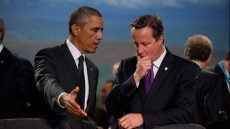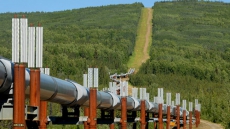TORONTO - GSK, Canada's largest flu vaccine supplier, will not be able to fill about 30 per cent of its Canadian order for the upcoming 2014-15 flu season, the company said Thursday.
That translates into about two million doses or 17 per cent of the total of 12 million doses the provincial, territorial and federal government ordered for this year.
The federal government quickly announced that it has been able to find alternate suppliers to cover most of GSK's shortfall. Those additional 1.2 million doses will come from the other companies that have a portion of Canada's annual vaccine contract.
As this year's total purchase was more than was used in the country last year, it's not clear at this point whether taking roughly 800,000 doses out of the mix will have any impact this flu season.
"Looking at our numbers, we're not anticipating any delays in supply or any substantive reduction in our supply," said Dr. Robert Strang, chief medical officer of health for Nova Scotia.
"So we're not anticipating any significant impact from this."
GSK said there will be a delay in delivery of the remainder of its order, roughly 4.4 million doses. But the Public Health Agency of Canada said the other suppliers will start shipping vaccine around mid-September, and the GSK product should start shipping in the second and third week of October, before the early November start of flu vaccine campaigns in many jurisdictions.
The company also suggested the problems at its Ste. Foy, Que., plant may also have an impact on GSK's ability to deliver additional vaccine to the U.S. market from that plant this season. GSK said it hoped, however, to deliver 28 million doses to the U.S. market this year. The company also produces flu vaccine in Dresden, Germany.
Earlier the company had been predicting it would deliver between 28 million and 33 million doses to the U.S. for the 2014-15 flu season, 23 million of which were supposed to come from the Quebec plant.
"Challenges at our Ste. Foy facility in recent months have interfered with normal production and impacted delivery dates and the total amount of influenza vaccine supply we will make available in the U.S. and Canada for the 2014-15 flu season," spokesperson Michelle Smolenaars Hunter said in an email.
She said, however, that the company does believe it can fill the remainder of its Canadian order. "At this time, we do not anticipate further risks to volume of supply with respect to the balance of doses intended for the Canadian market during the 2014-15 influenza season."
GlaxoSmithKline, which now goes by the name GSK, said the problems in this year's production run were not related to earlier concerns raised this spring in separate inspections of the plant by the U.S. Food and Drug Administration and Health Canada.
The company said it identified irregular results in its routine quality control monitoring on Aug. 14 and suspended production to investigate and try to fix the problem. Production was reinstated on Aug. 26, but that downtime will delay delivery, the company said.
It also said it had an invalid test result on one component of the vaccine, which protects against three different strains of influenza.
"Based on our standard, approved processes, retesting was required. The test results gathered to date ... are inconclusive. This will result in just under two million committed doses no longer available (to Canada). We are continuing to investigate the cause of this issue," Smolenaars Hunter said.
Dr. Monika Naus of the B.C. Centre for Disease Control said if there are no additional delivery problems, her province should be fine.
"Right now we're in good shape. We're only going to be bringing in 5,000 doses less than we had planned. So that's a very small amount difference," said Naus, medical director for the BCCDC's immunization programs and vaccine preventable diseases service.
She said that assessment would change, both for B.C. and the entire country, if GSK found its problems were greater than they currently seem. If that were the case, decisions about who should get vaccine this winter would have to be made, she said.
Flu vaccine production is a business that is based on orders — manufacturers make what their clients tell them, in advance, that they will purchase. All would likely produce a little extra vaccine. But as this year's vaccine can't be sold next year, no producer makes loads of excess vaccine just in case demand increases after orders are placed.
"The bottom line this year is that we're hopeful that GlaxoSmithKline will be able to deliver on the remainder of its commitment and if that didn't happen, then we would need to replan, across the country basically," Naus said.
"If there was a bigger problem with GSK, if the rest of the vaccine was not to be released for use, then we would have a much bigger problem. Because I'm not sure we could secure alternate supplies."
The Public Health Agency of Canada has led contingency planning involving the provinces and territories since the FDA issued a warning letter to GSK about problems at the plant in mid-June.
Public Works and Government Services Canada, which bulk buys Canada's flu vaccine, secured the 1.2 million extra doses from Canada's other suppliers — Sanofi Pasteur, Novartis and MedImmune, which makes the nasal spray vaccine FluMist.





